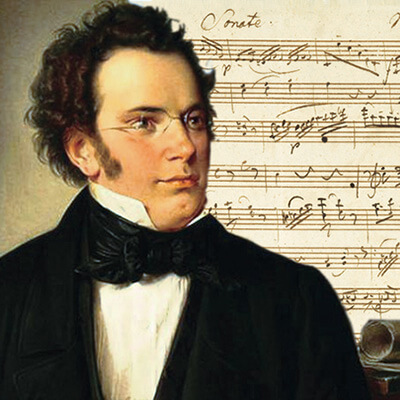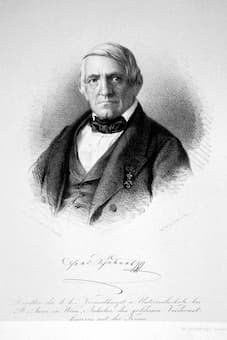
Grave of Franz Schubert at at
Central Cemetery Wiener Zentralfriedhof
Describing the emotional effects of the Latin mass settings by his brother Franz, Ferdinand Schubert writes, “For through these pious compositions every person, if there is so much as a glimmer of feeling in him, must be aroused to religious contemplation.” Franz Schubert had a rather critical attitude towards the Catholic Church. For him, religion was predominantly a private matter, yet contemporaries were astonished at the composer’s piety, which captured everyone’s emotions and attuned them to pray. “I think it comes from the fact,” he writes, “that I never force myself to pray, and, except when I am involuntarily overcome by it, never compose such hymns or prayers. Yet it is usually the correct and true devotion.” To be sure, Schubert’s faith was a questioning one, not wholly at ease with the established church, and “his regular omission of parts of the mass text may actually have reflected his doubts.”
Franz Schubert: Mass No. 6 in E-flat Major, D. 950, “Kyrie” (Ildikó Raimondi, soprano; Bernarda Fink, mezzo-soprano; Herbert Lippert, tenor; Helmut Wildhaber, tenor; Franz-Josef Selig, bass; Hugo Distler Choir; Martin Haselböck, cond.)

Franz Schubert © Seattle Choral Company
Fourteen years separate Schubert’s first setting of the mass from his sixth and last effort in E-flat Major. “His frequent return to the genre,” as a scholar explains, “suggested a self-renewing absorption in its challenges as the artist’s developing style opened new musical possibilities, whatever the religious convictions of the man.” His settings are firmly located in the liberal atmosphere of Biedermeier Vienna, and as such, to a particular theatrical instinct that corresponds to the dramatic scenery of the ordinary of the mass. Yet, given the expansive length of his final mass setting, it was clearly not intended for liturgical use. As with a good many other compositions, Schubert did not live to hear the first performance of his E-Major mass. It was premiered on 4 October 1829 at the Church of the Holy Trinity in the Vienna suburb of Alster. Ferdinand Schubert conducted the musical forces, and he did so again for a second performance at the same location on 15 November of that year.
Franz Schubert: Mass No. 6 in E-flat Major, D. 950, “Gloria” (Ildikó Raimondi, soprano; Bernarda Fink, mezzo-soprano; Herbert Lippert, tenor; Helmut Wildhaber, tenor; Franz-Josef Selig, bass; Hugo Distler Choir; Martin Haselböck, cond.)

Ferdinand Schubert
Critics, as was rather usual when it came to Schubert’s music, had a difficult time coming to terms with the expansive nature of the work. The Leipzig Allgemeine Musikzeitung reported on the second Viennese performance “that this work by the highly venerated composer was in no way satisfactory. The predominantly gloomy style by far better suits a requiem; all movements are drawn out to exhaustion, mostly rhapsodically; overloaded with wind and brass instruments, especially trombones… the appropriate range and position of the voices almost always fall short… one evasion offers its hand to another, the cold sweat that is shed is noticeable in the fugues, and there is only little that can be said to honor the penmanship.”
Franz Schubert: Mass No. 6 in E-flat Major, D. 950, “Credo” (Ildikó Raimondi, soprano; Bernarda Fink, mezzo-soprano; Herbert Lippert, tenor; Helmut Wildhaber, tenor; Franz-Josef Selig, bass; Hugo Distler Choir; Martin Haselböck, cond.)
A slightly more sympathetic review appeared in the Vienna Allgemeine Theaterzeitung on 22 October 1829. “It is his final and greatest, and as many connoisseurs claim, also his most beautiful mass, almost immediately after the completion of which grim death overtook him all too early. This great musical work is dominated by a character all its own…One must rightly call the entire work veritably magnificent, and its circulation must be urgently recommended to every true lover of genuinely uplifting sacred music and all admirers of the unforgettable composer.”
Franz Schubert: Mass No. 6 in E-flat Major, D. 950, “Sanctus” (Ildikó Raimondi, soprano; Bernarda Fink, mezzo-soprano; Herbert Lippert, tenor; Helmut Wildhaber, tenor; Franz-Josef Selig, bass; Hugo Distler Choir; Martin Haselböck, cond.)
![Church of the Holy Trinity [de] in Alsergrund, c. 1724, where Schubert's E-flat major mass received its first performance in 1829](https://interlude-cdn-blob-prod.azureedge.net/interlude-blob-storage-prod/2022/09/Alserkirche_Kupferstich.jpg)
Church of the Holy Trinity [de] in Alsergrund, c. 1724, where
the mass received its first performance in 1829
Schubert composed his E-flat Major Mass in response to a request by his childhood friend Michael Leitermayer, who was the choirmaster at the Church of the Holy Trinity. Schubert might well have had various drafts for a mass composition in his portfolio, but the first date appearing on the score reads June 1828, a mere five months before his tragically early death. In the year of his death, Schubert composed an abundance of works, including the heavenly C-major String Quintet, numerous Lieder, the last three piano sonatas, and a final unfinished symphony. He did complete the E-flat Major mass on 19 November 1828, “finally breaking open the framework of liturgical function.”
Franz Schubert: Mass No. 6 in E-flat Major, D. 950, “Benedictus” (Ildikó Raimondi, soprano; Bernarda Fink, mezzo-soprano; Herbert Lippert, tenor; Helmut Wildhaber, tenor; Franz-Josef Selig, bass; Hugo Distler Choir; Martin Haselböck, cond.)
As a concert mass, the work not only does away with various conventions, it also strongly influenced Anton Bruckner, and especially Johannes Brahms. In 1865 Brahms anonymously edited the work, which was published as a piano score by Rieter-Biedermann in 1865. Brahms wrote to his friend Johann Baptist Gänsebacher “…now, however, it seems to me that the most important thing is that the work is sent into the world as artistically and decently as possible, as befits the man and our love for him.” As Brahms subsequently wrote, “my love for Schubert is a serious one, precisely because it is not a passing fancy.” It has even been suggested that his editorial work on Schubert’s Mass in E-flat directly influenced the composition of his own German Requiem.
For more of the best in classical music, sign up to our E-Newsletter
Franz Schubert: Mass No. 6 in E-flat Major, D. 950, “Agnus Dei” (Ildikó Raimondi, soprano; Bernarda Fink, mezzo-soprano; Herbert Lippert, tenor; Helmut Wildhaber, tenor; Franz-Josef Selig, bass; Hugo Distler Choir; Martin Haselböck, cond.)
